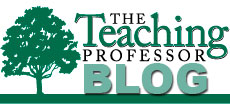There’s no discounting the importance of the first day of class. What happens that day sets the tone for the rest of the course. Outlined below are a few novel activities for using that first day of class to emphasize the importance of learning and the responsibility students share for shaping the classroom environment.
Read more ›CURRENT ARTICLE • January 09
OTHER RECENT ARTICLES
Figuring out final grades feels like closure. It’s the last time we think carefully about each student we’ve had in this set of classes. Some of them have done so well, and if they are students we’ve had in multiple courses, we feel such satisfaction as we watch what they are becoming. They make teaching worth the work. But then there are other students—the ones who failed because it just wasn’t the time in their lives to learn this content, the ones who didn’t have the skills they needed to make it, and the ones who passed the course but never connected with the content, the teacher, and sometimes, not even with their classmates. These are the students who some days make us wonder why we even bother.
Read More ›I’m betting that many of you are in the midst of grading a large stack of papers, projects or other final assignments. Too often these end-of-course pieces of work don’t live up to our expectations or students’ potential. It’s easy for us (especially the elders among us) to bemoan the fact that students aren’t what they used to be. It’s better to use our discontent to consider whether our course assignments are effectively accomplishing our course goals.
Read More › At most colleges, courses are starting to wind down and that means it’s course evaluation time. It’s an activity not always eagerly anticipated by faculty, largely because of those ambiguous comments students write. Just what are they trying to say?
At most colleges, courses are starting to wind down and that means it’s course evaluation time. It’s an activity not always eagerly anticipated by faculty, largely because of those ambiguous comments students write. Just what are they trying to say?
Sometimes our understanding of deep learning isn’t all that deep. Typically, it’s defined by what it is not. It’s not memorizing only to forget and it’s not reciting or regurgitating what really isn’t understood and can’t be applied. The essence of deep learning is understanding—true knowing. That’s a good start but it doesn’t do much to help students see the difference between deep and surface learning or to help persuade them that one is preferable to the other.
Read More › Are your students too answer oriented? Are they pretty much convinced that there’s a right answer to every question asked in class? When preparing for exams, do they focus on memorizing answers, often without thinking about the questions?
Are your students too answer oriented? Are they pretty much convinced that there’s a right answer to every question asked in class? When preparing for exams, do they focus on memorizing answers, often without thinking about the questions?
 There’s no hidden agenda here: Asking the question of what makes learning difficult doesn’t imply that the objective is to make the content easy. Material can be so watered down that its basic integrity is compromised. In the same vein, there’s no justification for making material harder than it needs to be, but the right balance between difficult and easy is not the subject of this post.
There’s no hidden agenda here: Asking the question of what makes learning difficult doesn’t imply that the objective is to make the content easy. Material can be so watered down that its basic integrity is compromised. In the same vein, there’s no justification for making material harder than it needs to be, but the right balance between difficult and easy is not the subject of this post.
Metacognition can be a word that gets in the way of students’ understanding that this "thinking about thinking" is really about their awareness of themselves as learners. Most students don’t spend much time thinking about learning generally or how they learn specifically. In order to become independent, self-directed learners, they need to be able to “orchestrate” their learning. That’s the metaphor the National Research Council uses to describe planning for learning, monitoring it as it occurs, and then evaluating both what has been learned and how it was learned.
Read More ›Teachers have much to teach these days. There’s the standard content knowledge students need to take from their courses, all the while the amount of new information in all our fields continues to grow exponentially. Next, there are all those essential intellectual skills like critical thinking, problem solving, analysis of evidence, argument construction to start the list. Then there are the basic skills many students are missing — like the ability to do college level reading, write coherently and calculate correctly — and all those study skills, like time management, review strategies, attentive listening and good note taking. Lastly, there are the metacognitive skills and the fact that most students aren’t aware of themselves as learners and don’t monitor how they are or are not learning. How in the world can a teacher address all these learning needs in a 15-week course?
Read More ›The pedagogical periodical Teaching Theology and Religion has a unique section. In fact, many of the discipline-based periodicals on teaching and learning have interesting and relevant features, which is one of the reasons why I continue to bemoan the positioning of so much of our scholarship on teaching and learning in the disciplines. These journals regularly include research findings and great strategies that address aspects of teaching and learning that transcend disciplines.
Read More ›




